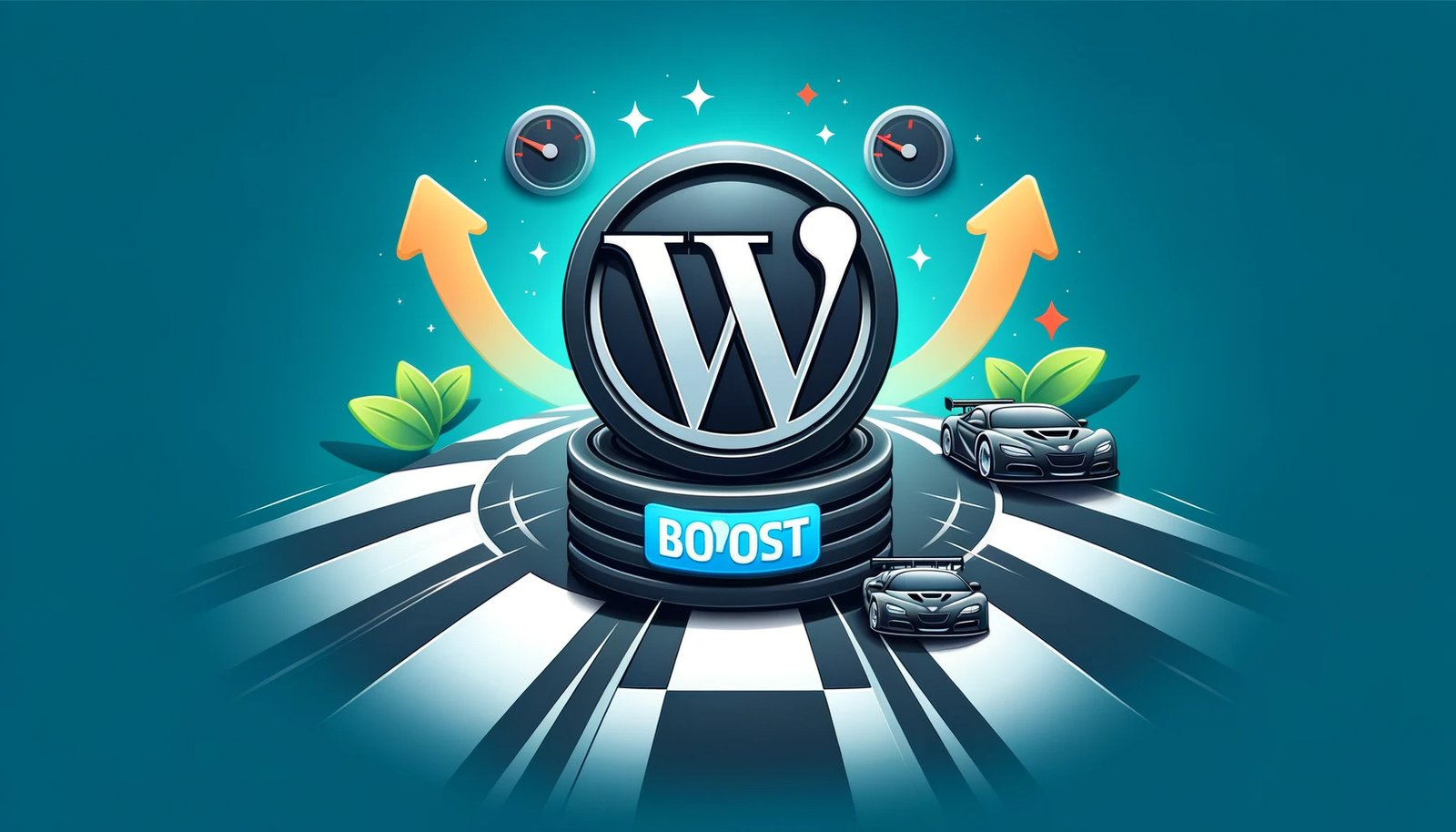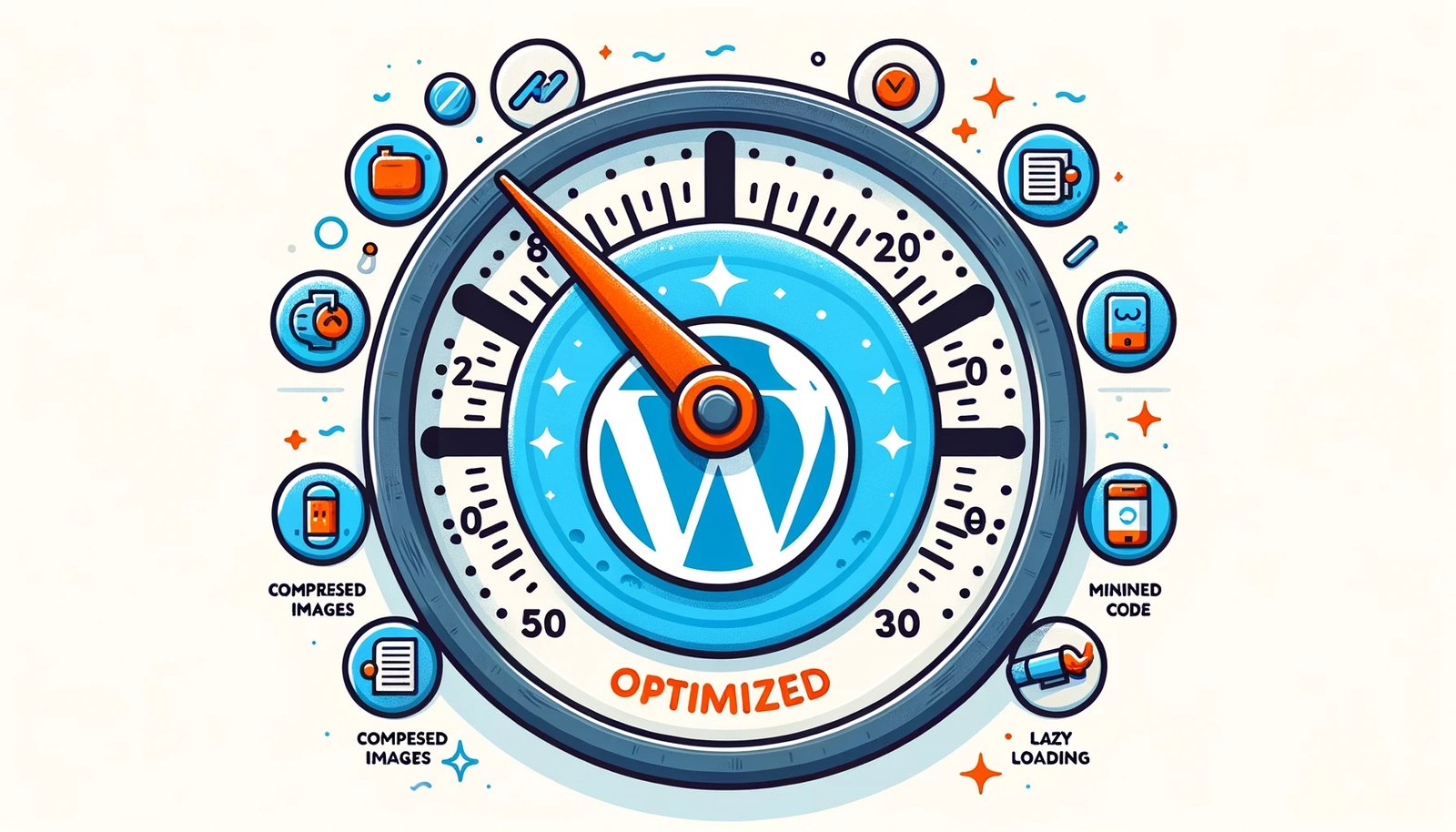Table of Contents
Toggle- Optimizing Performance in WordPress Web Development
- Introduction – Optimizing Performance in WordPress Web Development
- Foundations of WordPress Performance Optimization
- Industry and Niche-Specific Performance Optimization
- Infrastructure and Hosting
- Optimizing Website Elements
- Database and Backend Optimization
- Troubleshooting and Tools
- Best WordPress Performance Plugins
- Best WordPress Performance Themes
- Learning from Real-life Scenarios
- Best Practices and Trends
- WordPress Performance Trends for 2023
- How to Manage the WordPress Performance Optimization Process
- Tools and methodologies for performance testing
- Conclusion
Optimizing Performance in WordPress Web Development
Introduction – Optimizing Performance in WordPress Web Development
In the realm of website development, performance optimization has emerged as a pivotal aspect, especially when platforms like WordPress are in play. The digital landscape is evolving rapidly, and with it, the expectations of users. A website’s performance is no longer just about how quickly a page loads; it’s about the overall user experience, the efficiency of content delivery, and the seamless integration of design and functionality.
The significance of performance optimization in WordPress web development
WordPress, a platform that powers over 40% of the web, is renowned for its flexibility and user-friendly interface. However, with flexibility comes the responsibility of ensuring that the website performs at its peak. Performance optimization in WordPress web development is not just a luxury; it’s a necessity. A well-optimized WordPress website ensures that visitors remain engaged, reduces bounce rates, and boosts conversions. Moreover, in an era where user experience is paramount, a slow-loading website can be detrimental to a brand’s reputation. Thus, mastering performance optimization techniques in WordPress is crucial for web developers and website owners alike.
How performance impacts user experience and SEO rankings
Experience has shown that users are likely to abandon a website if it takes more than a few seconds to load. Every second counts and even a slight delay can lead to a significant drop in user engagement. However, the implications of website performance go beyond user experience. Search engines, especially Google, prioritize websites that load quickly and offer a seamless user experience. A website’s performance directly influences SEO rankings. A faster website not only provides a better user experience but also ranks higher in search results, leading to increased visibility and organic traffic.

Foundations of WordPress Performance Optimization
The foundation of any robust WordPress website lies in its performance optimization strategies. These strategies encompass various aspects, from server selection to code optimization, ensuring that the website is primed for speed, efficiency, and reliability.
How to Optimize WordPress Website Performance for Speed
Speed is of the essence in today’s digital age. With increasing internet speeds and user expectations, a slow-loading website is a surefire way to deter potential visitors. Optimizing WordPress for speed involves a multi-faceted approach:
- The correlation between site speed and user engagement: Studies have consistently shown a direct correlation between site speed and user engagement. A delay of even one second can lead to a 7% reduction in conversions. Furthermore, with the mobile-first approach gaining traction, the importance of site speed has skyrocketed. Mobile users, often on the go, expect websites to load instantly. A well-optimized website ensures that users remain engaged, leading to higher session durations, lower bounce rates, and increased conversions. For those looking to develop a fast-loading WordPress Business Website, it’s essential to prioritize performance from the outset.
How to Optimize WordPress Website Performance for Search Engines
Search Engine Optimization (SEO) and website performance are intrinsically linked. Search engines prioritize websites that offer a seamless user experience, and speed is a significant factor in this equation.
- SEO benefits of a well-optimized WordPress site: A fast-loading website is more likely to be crawled and indexed by search engines. Moreover, with Google’s mobile-first indexing, the performance of the mobile version of a website plays a crucial role in its SEO rankings. A well-optimized WordPress website, apart from offering a stellar user experience, also ensures that it meets the technical criteria set by search engines, leading to higher rankings and increased organic traffic. Those venturing into WordPress web development for beginners should be aware of the SEO advantages that a performance-optimized site can offer.
How to Optimize WordPress Website Performance for Mobile Devices
The proliferation of smartphones has led to a surge in mobile internet usage. Today, more than half of global internet traffic comes from mobile devices. As such, optimizing WordPress websites for mobile devices is not just recommended; it’s imperative.
- Importance of mobile optimization in today’s mobile-first world: A mobile-optimized website ensures that users on smartphones and tablets have an experience tailored to their devices. This includes responsive design, touch-friendly navigation, and faster load times. With Google’s emphasis on mobile-first indexing, a website’s mobile performance directly impacts its SEO rankings. Moreover, a mobile-optimized website ensures that users have a seamless experience, irrespective of the device they’re using, leading to higher engagement and conversions. For those offering WordPress Consulting Websites services, ensuring mobile optimization is paramount.
Industry and Niche-Specific Performance Optimization
In the realm of WordPress web development, understanding the unique performance needs of specific industries and niches is paramount. Different sectors have varying requirements, and a one-size-fits-all approach can often lead to suboptimal results. Let’s explore how to tailor performance strategies for specific industries and niches.
How to Optimize WordPress Website Performance for Specific Industries
Every industry, be it healthcare, education, or e-commerce, has its unique set of challenges and opportunities. For instance, e-commerce sites might prioritize load times for product pages, while educational platforms might focus on streaming video content. By understanding the nuances of each sector, you can tailor your WordPress performance strategies to meet specific industry demands.
Tailoring performance strategies for industries like healthcare, education, and e-commerce
In the healthcare industry, patient data security and portal responsiveness might be of utmost importance. On the other hand, educational websites might prioritize seamless video streaming and interactive modules. Meanwhile, e-commerce platforms require swift product page loads and secure transaction processes. Recognizing these distinct needs and optimizing accordingly can significantly enhance user experience and operational efficiency.
How to Optimize WordPress Website Performance for Specific Niches
Beyond broad industries, niches like food blogs, travel diaries, or fashion portfolios have their unique performance optimization needs. A food blog might prioritize high-resolution image loading, while a travel diary could focus on integrating interactive maps.
Niche-specific tips for food, travel, fashion blogs, and more
For instance, a fashion blog might benefit from swift image carousel transitions, while a travel blog could optimize for embedding videos or 3D tours. Recognizing the specific requirements of your niche and implementing targeted performance strategies can set your WordPress site apart from the competition.

Infrastructure and Hosting
The foundation of any high-performing WordPress website lies in its infrastructure and hosting solutions. Making informed decisions in these areas can significantly impact your site’s speed, reliability, and overall performance.
How to Choose a Fast WordPress Hosting Provider
Choosing the right hosting provider is a pivotal decision in your WordPress performance optimization journey. The right host can ensure swift load times, high uptime, and robust security.
Factors to consider when selecting a hosting provider for optimal performance
Several factors come into play when choosing a hosting provider. Consider aspects like server location, scalability options, customer support quality, and, of course, the cost. Providers specializing in WordPress hosting often offer features tailored to optimize WordPress site performance.
How to Use WordPress Content Delivery Networks (CDNs)
CDNs play a crucial role in distributing your website’s content efficiently across the globe, ensuring that users access data from a server closest to them and enhancing load times.
Leveraging CDNs to distribute content efficiently to a global audience
Implementing a CDN can drastically reduce your website’s load times for users from various geographical locations. By caching content on multiple servers worldwide, CDNs ensure that a user in Tokyo and another in New York experience similar swift load times when accessing your WordPress site.
Optimizing Website Elements
Website elements, from images to code, play a crucial role in determining the performance of a WordPress site. Properly optimized elements can drastically improve load times, enhance user experience, and boost SEO rankings. Let’s explore the various facets of optimizing these elements.
How to Optimize WordPress Website Images
Images often constitute a significant portion of a website’s load time. Optimizing them can lead to noticeable improvements in site speed and user experience.
Techniques and tools for image compression without compromising quality
There are several techniques to compress images without sacrificing their quality. Tools like TinyPNG or Smush can reduce image file sizes while maintaining visual fidelity. Additionally, choosing the right format (JPEG, PNG, WebP) based on the image’s content and purpose can also aid in optimization. Implementing responsive images, where different image sizes are delivered based on the user’s device, can further enhance performance on WordPress sites.
How to Optimize WordPress Website Code
Clean and efficient code is the backbone of a high-performing website. Streamlining your site’s code can lead to faster load times and a smoother user experience.
Cleaning up and streamlining code for faster load times
Removing unnecessary or redundant code, avoiding inline CSS or JavaScript, and organizing your code hierarchically can significantly improve site performance. Tools like WordPress plugins can assist in cleaning up and optimizing your site’s code.
How to Use WordPress Caching Plugins
Caching is a technique that stores a version of your site in a temporary storage location, reducing the need to fetch data repeatedly from the database and leading to faster page loads.
A guide to caching and its benefits for WordPress sites
Plugins like W3 Total Cache or WP Super Cache can be instrumental in implementing caching on your WordPress site. By storing static versions of your site, these plugins reduce server load and improve page speed. Regularly clearing and updating your cache ensures that users see the most recent version of your site.
How to Minify WordPress Website CSS and JavaScript
Minification involves removing unnecessary characters (like whitespace) from code without changing its functionality, leading to reduced file sizes.
Reducing file sizes for faster page loads
Tools such as Autoptimize or WordPress plugins can help in minifying CSS and JavaScript files. This process can significantly reduce the amount of data a browser needs to download, leading to quicker page loads.
How to Defer and Lazy Load WordPress Website Assets
Deferring assets means delaying the loading of non-essential files until they’re needed, while lazy loading loads assets (like images) only when they come into the viewport.
Loading assets only when they’re needed to improve initial page load times
Implementing defer and lazy load can drastically improve initial page load times. For instance, if a user doesn’t scroll to the bottom of a page, images there won’t be loaded, saving bandwidth. Plugins like Lazy Load by WP Rocket can assist in implementing this on WordPress sites.
Database and Backend Optimization
The database is the heart of any WordPress website. It stores content, settings, user data, and more. Optimizing the database can lead to significant improvements in website performance.
How to Optimize WordPress Database Performance
A well-maintained database ensures that your website runs smoothly and loads quickly. Regular optimization can prevent slowdowns and potential crashes.
Regular maintenance and optimization tips for the WordPress database
Regularly cleaning up your database by removing unnecessary data, optimizing tables, and using tools like WP-Optimize can keep your website running efficiently. It’s also essential to monitor the size of your database and ensure that it doesn’t become bloated with redundant or outdated information. Regular backups, using tools like UpdraftPlus, ensure data safety during optimization processes.
Troubleshooting and Tools
Performance issues can arise from various sources. Identifying and resolving these bottlenecks is crucial for maintaining an optimal user experience.
How to Troubleshoot WordPress Website Performance Issues
Every website can encounter performance issues. The key is to identify them early and resolve them efficiently.
Identifying and resolving common performance bottlenecks
Using tools like Query Monitor or GTmetrix can help pinpoint slow-loading elements or scripts on your site. Once identified, these issues can be addressed by optimizing images, reducing server requests, or updating inefficient plugins. Regularly monitoring your website’s performance ensures that any issues are promptly addressed.
Best WordPress Performance Plugins
Plugins can significantly enhance the performance of a WordPress website. However, it’s essential to choose the right ones.
Top plugins that can help enhance website speed and reliability
Plugins like W3 Total Cache, WP Super Cache, and Asset CleanUp can drastically improve site speed. Additionally, image optimization plugins like Smush or ShortPixel can reduce image sizes without compromising quality. It’s crucial to regularly update and test these plugins to ensure they remain compatible with the latest WordPress versions.
Best WordPress Performance Themes
The theme you choose can have a significant impact on your website’s performance. Opting for a lightweight, well-coded theme can lead to faster load times and a better user experience.
Themes designed with speed and optimization in mind
Themes like Astra, GeneratePress, and OceanWP are built with performance in mind. They are lightweight, SEO-friendly, and highly customizable, making them ideal for WordPress sites aiming for optimal performance.
Learning from Real-life Scenarios
Real-world case studies provide invaluable insights into the challenges and successes of performance optimization.
WordPress Performance Case Studies
Analyzing real-world scenarios can offer lessons on what to do (and what not to do) when optimizing a WordPress site.
Analyzing real-world examples of performance optimization successes and challenges
By studying websites that have successfully optimized their performance, we can glean best practices and strategies to implement. Conversely, analyzing sites that have faced performance issues can offer lessons on pitfalls to avoid. These case studies serve as a roadmap for WordPress developers aiming for peak site performance.
Best Practices and Trends
Performance optimization is an evolving field, with best practices and trends that shift as technology advances and user expectations change.
WordPress Performance Best Practices for Beginners to Experts
Regardless of your experience level, certain foundational best practices can significantly impact your WordPress site’s performance.
Universal tips that every WordPress site owner should know
- Choose a Reliable Hosting Provider: Your hosting environment plays a crucial role in your site’s performance. Opt for providers known for their speed and reliability.
- Use a Content Delivery Network (CDN): CDNs like Cloudflare can distribute your site’s content globally, reducing load times for international visitors.
- Optimize Images: Large image files can slow down your site. Use tools like Smush or ShortPixel to compress images without sacrificing quality.
- Limit Plugins: Only install necessary plugins and ensure they’re regularly updated.
- Regular Backups: Use plugins like UpdraftPlus to schedule regular backups, ensuring data safety.
WordPress Performance Trends for 2023
As technology evolves, so do the trends in performance optimization.
Upcoming technologies and practices shaping the future of WordPress performance
WebAssembly, HTTP/3, and edge computing are some of the emerging technologies expected to shape WordPress performance in 2023. Additionally, a shift towards serverless architectures and progressive web apps (PWAs) will influence how WordPress sites are developed and optimized.
Seeking Expertise and Continuous Improvement
Performance optimization is a continuous journey, and sometimes, seeking external expertise can provide significant benefits.
How to Hire a WordPress Performance Expert to Help You Optimize Your Website
While many site owners can handle basic optimization tasks, complex issues might require expert intervention.
When and why to seek expert assistance for performance optimization
When your site faces persistent speed issues or when you’re about to launch a significant online campaign, it might be time to hire an expert. An experienced WordPress performance expert can provide insights, strategies, and solutions that might be beyond the average site owner’s knowledge.
How to Manage the WordPress Performance Optimization Process
Optimization is an ongoing process requiring regular monitoring and adjustments.
Ongoing strategies for maintaining peak website performance
Regularly monitor your site’s speed using tools like GTmetrix or Google PageSpeed Insights. Schedule monthly audits, optimize any new content, and stay updated with the latest WordPress updates and trends.

How to Test the Performance of Your WordPress Website
Testing is crucial to understand where your site stands and what improvements are needed.
Tools and methodologies for performance testing
Tools like Pingdom, Load Impact, and Query Monitor can provide comprehensive insights into your site’s performance, helping identify bottlenecks and areas for improvement.
How to Launch a High-Performance WordPress Website
Before launching, ensure your site is primed for optimal performance.
Final checks and considerations before going live
Ensure all images and content are optimized, caching is enabled, and unnecessary plugins are deactivated. Conduct a final speed test and ensure mobile optimization.
Conclusion
Performance optimization is not a one-time task but an ongoing commitment. A fast, responsive website not only provides a better user experience but also significantly impacts SEO rankings and overall online success.
-
-
- What does “performance optimization” mean in the context of WordPress web development?
- Answer: In the context of WordPress web development, performance optimization refers to the strategies and techniques employed to enhance the speed, efficiency, and responsiveness of a WordPress website, ensuring a faster load time and smoother user experience.
- Why is performance optimization crucial for WordPress websites?
- Answer: Performance optimization is essential for WordPress websites to improve user experience, reduce bounce rates, enhance SEO rankings, and ensure efficient resource utilization, leading to better conversion rates and user engagement.
- How can I measure the current performance of my WordPress website?
- Answer: You can measure the performance of your WordPress website using tools like Google PageSpeed Insights, GTmetrix, and Pingdom. These tools provide insights into load times, bottlenecks, and suggestions for improvement.
- What are the common factors that can slow down a WordPress website?
- Answer: Common factors include unoptimized images, excessive plugins, poorly coded themes, lack of caching, outdated WordPress core, and slow hosting providers.
- How can caching improve the performance of a WordPress website?
- Answer: Caching stores frequently accessed data in a readily accessible state, reducing the need to fetch data from the database or server repeatedly. This results in faster page load times and reduced server load.
- Which plugins can help in optimizing the performance of a WordPress website?
- Answer: Popular performance optimization plugins include W3 Total Cache, WP Super Cache, Autoptimize, and WP Smush for image optimization.
- How does a Content Delivery Network (CDN) enhance WordPress performance?
- Answer: A CDN distributes website content across multiple servers located worldwide. When a user accesses the website, content is delivered from the nearest server, reducing latency and speeding up load times.
- How can I optimize images to improve the performance of my WordPress site?
- Answer: Image optimization can be achieved by compressing images without losing quality, using appropriate image formats (e.g., WebP), and employing lazy loading techniques. Plugins like WP Smush and ShortPixel can assist in this process.
- How do themes impact the performance of a WordPress website?
- Answer: Themes play a significant role in website performance. Lightweight, well-coded themes can enhance speed and responsiveness, while bloated themes with excessive features can slow down a website.
- How often should I update my WordPress core, themes, and plugins for optimal performance?
- Answer: Regular updates are crucial. Always ensure you’re using the latest versions of the WordPress core, themes, and plugins. Updates often come with performance improvements, bug fixes, and enhanced security features.
-







